“Sit down in that chair,” said the senator, pointing with his cane to the only chair in the room. His voice had the effect of a strong muscular compulsion to which men at once yielded. Aladdin sat into the big chair, his toes swinging just clear of the ground. Then there was silence. Aladdin broke it.
“Is Margaret all right?” he gulped.
The senator disregarded the question. Having chosen his words, he said them.
“I do not know,” he began, “what my daughter was doing in a boat with you. I do not object to her enjoying the society at proper times of suitable companions of her own age, but the society of those who lead her into temptation is not suitable.” Aladdin fairly wilted under the glowering voice. “You will not be allowed to associate with her any more,” said the senator. “I will speak to your father and see that he forbids it.”
Aladdin climbed out of the chair, and stumbled blindly into the table. He had meant to find the door and go.
“Wait; I have not done,” said the senator.
Aladdin turned and faced the enemy who was taking away the joy of life from him.
“In trying to atone for your fault,” said the senator, “by imperiling your life, you did at once a foolhardy and a fine thing—one which I will do my best to repay at any time that you may see fit to call upon me. For the present you may find this of use.” He held forward between his thumb and forefinger a twenty-dollar gold piece. Aladdin groped for words, and remembered a phrase which he had heard his own father return to a tormentor. He thrust his red hands into his tight pockets, and with trembling lips looked up.
“It’s a matter of pride,” he said, and walked out of the room. When he had gone the senator took from his pocket a leather purse, opened it, put back the gold piece, and carefully tied the string. Then far from any known key or tune the great man whistled a few notes. Could his constituents have heard, they would have known—and often had the subject been debated—that Hannibal St. John was human.




